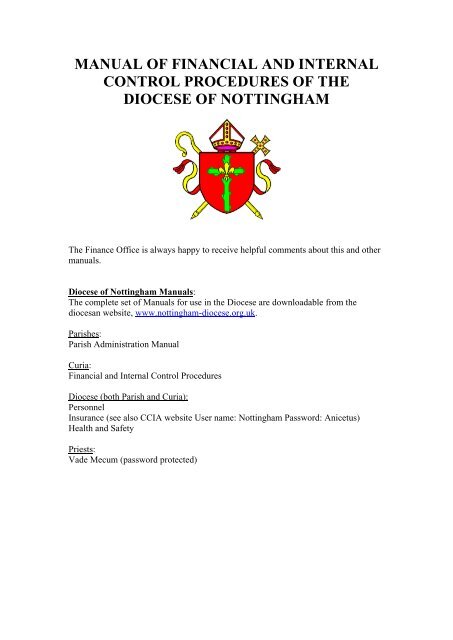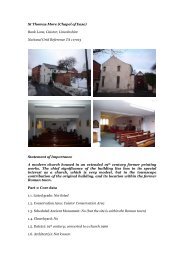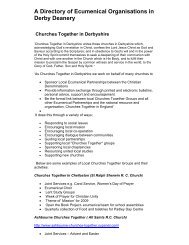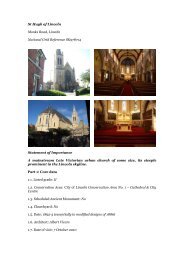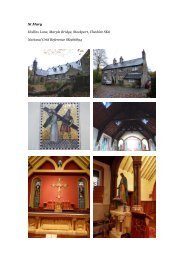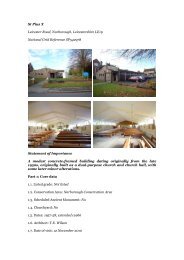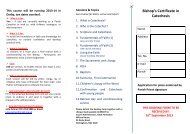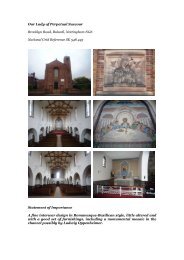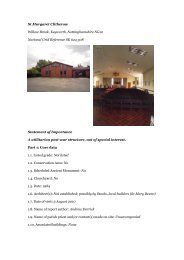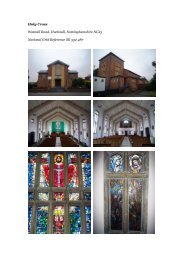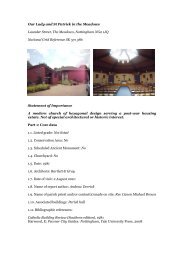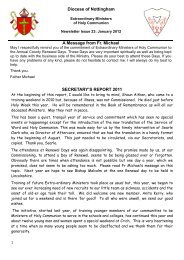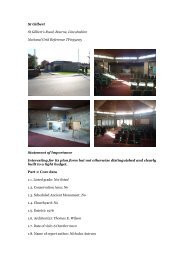Manual of Fiancial & Internal Control Procedures - Diocese of ...
Manual of Fiancial & Internal Control Procedures - Diocese of ...
Manual of Fiancial & Internal Control Procedures - Diocese of ...
You also want an ePaper? Increase the reach of your titles
YUMPU automatically turns print PDFs into web optimized ePapers that Google loves.
MANUAL OF FINANCIAL AND INTERNAL<br />
CONTROL PROCEDURES OF THE<br />
DIOCESE OF NOTTINGHAM<br />
The Finance Office is always happy to receive helpful comments about this and other<br />
manuals.<br />
<strong>Diocese</strong> <strong>of</strong> Nottingham <strong>Manual</strong>s:<br />
The complete set <strong>of</strong> <strong>Manual</strong>s for use in the <strong>Diocese</strong> are downloadable from the<br />
diocesan website, www.nottingham-diocese.org.uk.<br />
Parishes:<br />
Parish Administration <strong>Manual</strong><br />
Curia:<br />
Financial and <strong>Internal</strong> <strong>Control</strong> <strong>Procedures</strong><br />
<strong>Diocese</strong> (both Parish and Curia):<br />
Personnel<br />
Insurance (see also CCIA website User name: Nottingham Password: Anicetus)<br />
Health and Safety<br />
Priests:<br />
Vade Mecum (password protected)
FINANCIAL AND INTERNAL CONTROL<br />
Generally the Charity is a large one. However the number <strong>of</strong> people employed at any<br />
one <strong>of</strong>fice is not usually large, making internal control more difficult. In this case<br />
there is a particular duty on department heads to ensure that special care is taken over<br />
financial matters in particular when authorising and approving expenditure.<br />
1
THE BOARD OF DIRECTORS<br />
1. The running <strong>of</strong> the Charity is the legal responsibility <strong>of</strong> the Board <strong>of</strong> Directors<br />
<strong>of</strong> the Company. (Until 31 st March 2010 it was the responsibility <strong>of</strong> the<br />
Trustees). This Company is referred to as the charity or the <strong>Diocese</strong> in this<br />
manual.<br />
2. The Board delegates the responsibility <strong>of</strong> keeping proper books and records to<br />
the Finance Office. The Annual Report & Accounts and the budgets are<br />
prepared by the Finance Office and are formally approved by the <strong>Diocese</strong>.<br />
3. The Company has the power <strong>of</strong> appointing new Directors and the Bishop has<br />
an effective veto over the decisions <strong>of</strong> the Board. A new Director indicates<br />
the formal taking up <strong>of</strong> responsibilities by signing the notification to<br />
Companies House.<br />
4. The Board meets formally at least four times per annum.<br />
5. Each <strong>of</strong>fice, department or service, or by whatever name it is known, is under<br />
the formal control <strong>of</strong> the Board.<br />
6. Independent pr<strong>of</strong>essional advice is available to the Directors.<br />
7. The Directors’ liabilities are insured.<br />
Segregation <strong>of</strong> Duties<br />
8. Where possible key duties are segregated. A person having access to cash or a<br />
cheque signatory should not also be responsible for accounting records.<br />
9. Unless otherwise authorised by the department head incoming post should be<br />
opened by two people.<br />
10. A separate record will be maintained <strong>of</strong> money due into the charity, for<br />
example when legacies have been notified, or for Gift Aid and other<br />
donations. Follow up checks are then made to ensure that it has been received.<br />
Cash and Bank Balances.<br />
11. A list <strong>of</strong> bank accounts, their signatories (which will always include the<br />
Bishop, the Moderator <strong>of</strong> the Curia, the Chancellor, both Vicars General and<br />
the Financial Secretary) and their purpose will be recorded in the Finance<br />
Office. Accounts may be opened and closed only on the authority <strong>of</strong> the<br />
Finance Office.<br />
12. It is the policy <strong>of</strong> the Board that, where possible, new accounts are not opened<br />
and that all transactions take place through the main Diocesan account.<br />
13. The policy <strong>of</strong> the <strong>Diocese</strong> is that all cheques for payments above £5 thousand<br />
require two signatures, one <strong>of</strong> which will be one <strong>of</strong> those mentioned in the<br />
previous paragraph. No signatory may sign a cheque payable to him or<br />
herself. It is obviously not permitted to avoid the second signature on cheques<br />
above £5,000 by making out a series <strong>of</strong> cheques for under £5,000.<br />
2
14. Incoming cheques should be banked daily. If this is not possible they should<br />
be kept in a safe and banked as soon as possible and in any case at least<br />
weekly. Where they are banked by post full details should be kept (eg by<br />
photocopying) so that if mislaid replacement cheques can be obtained.<br />
Banking <strong>of</strong> cash should be gross and cash not held back for petty cash<br />
15. The charity’s money must be kept quite separately from personal money.<br />
(However this does not prevent expenditure being incurred originally in a<br />
personal name with a view to reimbursement at a later stage by the charity).<br />
16. Checks <strong>of</strong> cash books and the paying-in slips and cheque payments should be<br />
made from time to time by someone separate from the person originally<br />
recording the transaction. Bank reconciliations should be carried out each<br />
month, then independently checked and reviewed.<br />
17. Accounts may not go overdrawn without prior approval.<br />
18. When making payments, expenditure must be properly authorised and<br />
presented with the supporting documentation to the cheque signatories.<br />
19. Means <strong>of</strong> payments such as cheque books, building society passbooks and<br />
bank mandate forms must be kept in a safe with access limited.<br />
20. If possible the preparation <strong>of</strong> documentation for authorisation should be<br />
undertaken by someone other than the person authorising the payment. The<br />
person authorising should ensure that the goods or service being paid for have<br />
been ordered. The authorisation should be <strong>of</strong> original invoices only, if<br />
possible, (in order to ensure that an invoice is not paid twice). It should be<br />
stamped PAID with the date (or marked in some way in order to prevent its<br />
being paid twice) which should be in red. The authorisation is <strong>of</strong> the invoice<br />
and not the statement, again to avoid payments being made twice. Be<br />
particularly careful to avoid double payments where invoices have been<br />
emailed and can be downloaded and authorised twice in error.<br />
21. An order shall only be placed with the approval <strong>of</strong> the department head. If<br />
over £300 this will need to be written. Continuation <strong>of</strong> the following authority<br />
limits were determined by the Board at its meeting on 28 th September 2011.<br />
£300- £1000 Head <strong>of</strong> Department<br />
£1,000 - £5,000 Financial Secretary/ Moderator <strong>of</strong> the Curia<br />
£5,000 - £50,000 (£100 thousand having consulted the Board) Management<br />
and Finance Committee<br />
£5,000 - £250,000 (£650 thousand having consulted the Board) Building and<br />
Sites Committee – property transactions only.<br />
Above these limits Board <strong>of</strong> Directors.<br />
22. The record placed <strong>of</strong> orders should allow for the amount <strong>of</strong> outstanding orders<br />
to be ascertained.<br />
3
23. Under no circumstances whatsoever are blank cheques to be signed in<br />
advance. In the words <strong>of</strong> the Charity Commission guide, “It is a<br />
dangerous breach <strong>of</strong> financial controls” and “the practice <strong>of</strong> signing<br />
blank cheques would be regarded as neglecting the duty <strong>of</strong> care owed by<br />
the charity”.<br />
24. Cheque expenditure is to be recorded in the cash book with details <strong>of</strong> the date,<br />
payee, cheque number and amount. Cheque book stubs are to be completed at<br />
the time <strong>of</strong> payment (as they form part <strong>of</strong> the charity’s accounting records).<br />
Where, exceptionally, a card has been provided for use for charity expenditure<br />
a separate account will be associated with it to assist with control <strong>of</strong> that<br />
expenditure.<br />
25. Cash payments are to be kept to a minimum because <strong>of</strong> the difficulties <strong>of</strong><br />
internal control over them.<br />
26. Proper supporting independent documentation for all payments and remittance<br />
advices for receipts must be retained and kept in the designated files and be<br />
available for internal check or external audit however the payment or receipt is<br />
made.<br />
27. Payment for expenses to be reimbursed should be submitted in a reasonable<br />
time, normally monthly, authorised independently (normally by a department<br />
head) and properly supported in the usual way as noted above.<br />
Accounting Records<br />
28. There will be proper records kept, enabling an audit trail from the original<br />
documents to the final accounts.<br />
29. Allocation <strong>of</strong> expenses to the right account is important, particularly where a<br />
restricted fund is to be charged.<br />
30. Budgets will be set in discussion with each department and agreed by the<br />
Trustees. Underspending against budget in a year cannot be carried forward<br />
or transferred to another account without approval <strong>of</strong> the Finance Office.<br />
31. It is intended that a fixed asset register will be prepared. Nothing is<br />
capitalised in the accounts unless its value is greater than £5,000. This does<br />
not prevent a fixed asset register record <strong>of</strong> details <strong>of</strong> items with lower values<br />
but they will not be treated as capital expenditure in the accounts and<br />
depreciated.<br />
32. Each person for whom a computer is provided is responsible for their own<br />
computer housekeeping routines, including back up, remote back up and other<br />
housekeeping routines such and also for ensuring that back up media are<br />
physically destroyed when no longer required. A department head is<br />
responsible for ensuring the same for the department’s network server and also<br />
for ensuring that hard drives <strong>of</strong> computers are destroyed when no longer<br />
required. A remote back up should be taken at least monthly.<br />
4
Guardianship <strong>of</strong> Assets<br />
33. Assets are generally held in the name <strong>of</strong> the Company. Where the strict<br />
requirements <strong>of</strong> legislation are followed, whereby the beneficial ownership <strong>of</strong><br />
the assets is beyond doubt, they may held in other names.<br />
34. The Board is responsible for the Investment Policy, a copy <strong>of</strong> which is<br />
available from the Finance Office.<br />
35. Investment performance is the responsibility <strong>of</strong> the Management and Finance<br />
Committee <strong>of</strong> the Board and is to be brought to its attention.<br />
36. The opening and closing <strong>of</strong> bank accounts are to be authorised by the charity.<br />
Dormant accounts should be reviewed from time to time and closed if<br />
necessary.<br />
37. The fixed asset register needs to be checked to the fixed assets themselves<br />
from time to time. The condition <strong>of</strong> the fixed asset should be noted at that<br />
time.<br />
38. A proper register is maintained <strong>of</strong> land and buildings. This should be<br />
expanded to include data relevant to their maintenance and insurance. It<br />
should also include, for leased property, details <strong>of</strong> the terms <strong>of</strong> the lease. A<br />
proper diary system is to ensure that the relevant notices are given at the<br />
correct time for leased property.<br />
39. Generally, where a property is let, the <strong>Diocese</strong> as landlord should insure and<br />
then pass the cost on to the tenant through the lease.<br />
40. The disposition (including selling or leasing) or charging <strong>of</strong> land is subject to<br />
the special requirements for them under the Charities Acts.<br />
41. Protection <strong>of</strong> the documents <strong>of</strong> title are the responsibility <strong>of</strong> the property<br />
department. That department will also have responsibility for other legal<br />
documents. It is essential that a receipt is always obtained for legal<br />
documents which leave the building.<br />
Special Computer <strong>Procedures</strong><br />
43. All Curia departments must:<br />
a) ensure that personal data held is secure.<br />
b) this includes physical security – doors which protect rooms which provide<br />
access to personal data should be kept locked.<br />
c) password protection should be used to control access to information and<br />
encryption if appropriate for very secure data.<br />
d) ensure proper arrangements for back up.<br />
5
e) train its staff on procedures including not using the personal data other than<br />
for use for the Parish.<br />
f) provide records as necessary so it is clear who has had access to personal data.<br />
44. Use <strong>of</strong> antivirus s<strong>of</strong>tware is compulsory.<br />
45. Physical controls are important and a server with sensitive data on it should be<br />
locked physically as should the back- up media.<br />
46. Installation <strong>of</strong> new s<strong>of</strong>tware will require the approval <strong>of</strong> the head <strong>of</strong><br />
department. All s<strong>of</strong>tware must, <strong>of</strong> course, be properly licensed.<br />
Miscellaneous<br />
47. Meeting notes should be circulated within 7 days <strong>of</strong> a meeting. It takes no<br />
longer to prepare them in good time as at a later date and preferable to have<br />
them while the meeting is fresh in the minds <strong>of</strong> those attending.<br />
48. While the <strong>Diocese</strong> is in principle happy to support those who wish to take part<br />
in national activities connected with the Church, this requires the prior<br />
approval <strong>of</strong> the Board. There are two aspects to this. The first is that the<br />
priority over an employee’s duties is the responsibility <strong>of</strong> the <strong>Diocese</strong>. The<br />
second is that there can be cost implications, for example for additional<br />
support. The approach should give details and the approval <strong>of</strong> the head <strong>of</strong> the<br />
relevant department will also be required.<br />
49. The <strong>Diocese</strong> is under a duty under certain circumstances to make a report to<br />
the Charity Commission if a serious incident takes place. In practice such a<br />
matter will be associated with a possible insurance claim and the advice <strong>of</strong> the<br />
<strong>Diocese</strong>’s insurers will be sought before a report is made.<br />
50. The Management and Finance Committee will consider requests for mobile<br />
phones to be provided to Curia employees who travel on Diocesan business<br />
widely.<br />
51. Loans may not be made to members <strong>of</strong> staff for cars or otherwise (policy<br />
confirmed by the Board 28 th September 2011).<br />
Adopted October 2011.<br />
6


